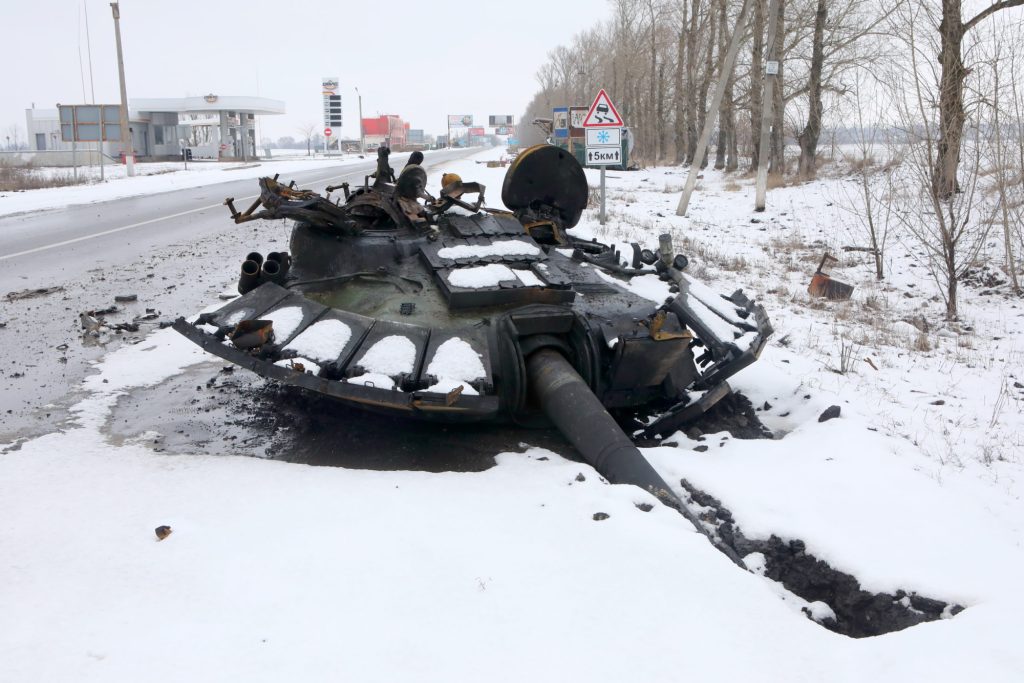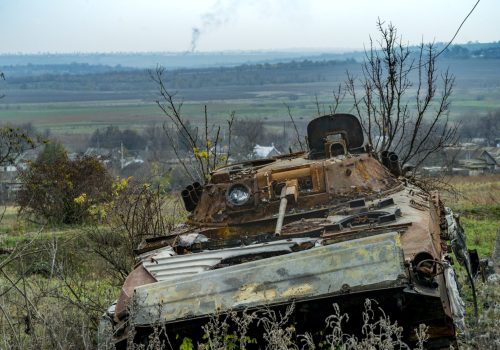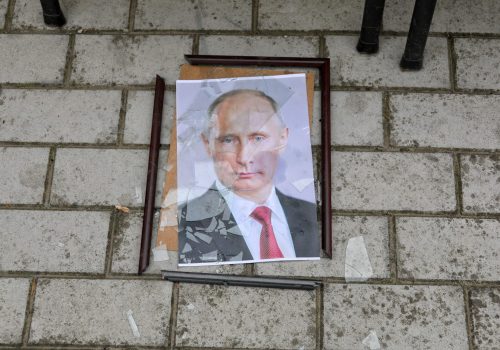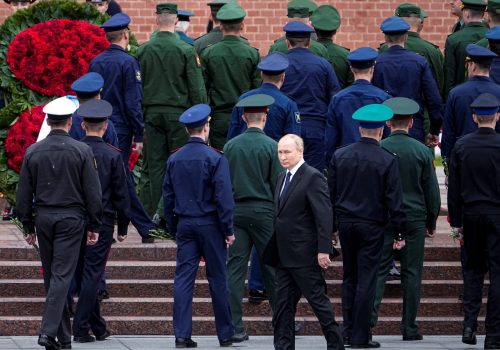When Vladimir Putin launched the full-scale invasion of Ukraine in February 2022, he was expecting a quick and decisive victory that would cement his place in Russian history and reverse the verdict of 1991 by extinguishing Ukrainian independence once and for all. Instead, the year draws to a close with his army demoralized by successive defeats and Russia’s reputation as a military superpower in tatters.
In the first days of the invasion, it soon became clear that things were not going according to plan. Far from greeting Russian troops as liberators, the Ukrainian nation rose up in defiance. Kremlin intelligence forecasts predicting the rapid collapse of the Ukrainian military also proved wildly inaccurate. On the contrary, Ukrainian forces fought back with unexpected skill and ferocity, leading to catastrophic Russian losses.
By the end of March, Russia had conceded defeat in the Battle of Kyiv and withdrawn entirely from northern Ukraine. Putin responded to this setback by regrouping his decimated forces in eastern Ukraine and concentrating on completing the occupation of the Donbas region. Despite initial success due to Russia’s overwhelming artillery advantage, this offensive had largely stalled by midsummer with the initiative passing to Ukraine.
The second half of 2022 was marked by a series of spectacular Ukrainian victories. Russian troops were routed in the Kharkiv region and forced to retreat from the strategically important southern city of Kherson, the only Ukrainian regional capital to be occupied by Russia. The withdrawal from Kherson was a personal humiliation for Putin. Just weeks earlier, he had hosted a lavish annexation ceremony in the Kremlin and proclaimed that Kherson had joined Russia “forever.”
Unable to make progress on the battlefield, Putin changed tack in October and ordered the methodical destruction of Ukraine’s civilian infrastructure. Waves of airstrikes featuring missiles and kamikaze drones have since plunged Ukraine into darkness while depriving millions of Ukrainians of heating, water, and electricity. This bombing campaign is causing great hardship but does not appear to be undermining Ukraine’s fighting spirit.
While the Russian dictator’s dreams of an historic victory have failed to materialize, he is not yet ready to admit defeat. In September, Putin announced his country’s first mobilization since World War II, allowing him add a further 300,000 men to his depleted invasion force. Additional waves of mobilization are possible in the coming months. On the home front, the Russian economy is being prepared for the rigors of a long war. Nor is there any sign of significant domestic unrest. Polls indicate that most Russians continue to support the invasion, while those who do not have largely remained silent or chosen exile over protest.
There is currently no end in sight to the Russian invasion of Ukraine. Kremlin officials insist Moscow will achieve its objectives, while Western leaders are equally adamant that Russia must not be allowed to succeed. Meanwhile, the vast majority of Ukrainians see the war as a fight for national survival against an openly genocidal enemy. This leaves little room for negotiations or a compromise peace.
With fighting set to continue into 2023, the Atlantic Council invited a range of experts to share their observations of the war so far. Why has Putin’s Ukraine invasion gone so disastrously wrong?
Daniel Fried, Weiser Family Distinguished Fellow, Atlantic Council: What went wrong? Lots of little things but two big things in particular: Russia’s failure to understand Ukraine and its failure to understand its own system. The Kremlin seems to have believed its own propaganda that the Ukrainian nation does not exist except in subordination to Russia. In this view, a Ukrainian nation that insists it has separate identity and national existence is merely a fascist deformity that must be destroyed by fire and sword. Those familiar with Russian and Soviet imperial thinking can discern the antecedents: Nineteenth century Russian reactionary nationalism and its Soviet counterpart that attempted to identify any Ukrainian patriotism exclusively with its right-wing expression during WWII.
The Kremlin seems not to grasp how deep Ukrainian patriotism runs and how it has taken shape in a more liberal, multi-ethnic, and pro-democratic form, partly in revulsion against Putinism and its malign values. This spirit of patriotism, personified but not created by Ukrainian President Volodymyr Zelenskyy, has so far enabled the Ukrainian military to maintain its morale and helped Ukrainian society stand firm in the face of terror and deprivation.
In contrast, Putin’s corrupt system fueled by theft and deceit has hollowed out the Russian military and left Russian society generally cynical. Russian state television features bloodthirsty commentators while thousands of Russian young men flee the country to avoid military service. The sacrifices Ukrainians are willing to make as they fight for their lives and their country seem foreign to Putin’s Russia. Like the Czarist regime in the early twentieth century, Putin seems to have believed a “short victorious war” was just the tonic his system needed. But Russia’s failure in the 1904-5 Russo-Japanese War merely exposed the rot at the heart of the empire.
Tyrannies often turn out to be weaker than the image put forth by their strutting leaders. Democracies often turn out to be resilient in ways that can astonish those who look no further than their messy politics or peacetime pettiness. So it seems with Russia and Ukraine, with the battle still in the balance.
Suriya Evans-Pritchard Jayanti, Nonresident Senior Fellow, Atlantic Council: With Russian atrocities continuing, it is still far too soon to declare that Putin has failed in his effort to make Ukraine sorry for not wanting to be Russian. At the same time, it’s certainly clear that he is not winning. This failure to win is rooted in Putin’s own lack of understanding that Ukrainians are not Russians. Obviously, this is most immediately evident in Ukraine’s willingness to fight in order to avoid being forcibly subsumed into Russia.
On a deeper level, Ukrainians have demonstrated emphatically that they differ from their Russian neighbors in terms of the national character they have displayed during the past ten months of war. The innovation, work ethic, and commitment to country over self shown by Ukrainians are all qualities that, if they previously existed in Russia, Putin himself has worked hard to erode.
Since February, Putin has found Ukraine a very a different opponent compared to the country he expected to face. Ukraine’s aptitude for teamwork and ability to rapidly change tactics are factors that he simply has no answer for. And it is these same Ukrainian qualities that will ensure the country eventually rebuilds and rebounds.
Steve Pifer, William J. Perry Fellow, Center for International Security and Cooperation, Stanford University: Several reasons help explain why Russia’s invasion of Ukraine has gone so badly. First, the Kremlin and Russian General Staff greatly underestimated their foe and did not expect the Ukrainians to resist with such tenacity, skill, and courage. It is astonishing that they so badly misunderstood their neighbor. It was clear to Western observers that Ukrainians would fiercely resist, as they see this as an existential fight.
Second, the Russian military has not mastered certain complex tactics such as combined arms operations and suppression of enemy air defenses. For example, armored columns entered urban areas unsupported by dismounted infantry, while Russian air power stays largely over Russian-controlled territory for fear of being shot down by Ukrainian air defense. This adds to other problems endemic in Russia’s military such as poor leadership, poor morale, and poor logistics.
Third, the Kremlin has discovered that the defense sector is not immune from the corruption that pervades Russian society. Moscow is not getting the results it expected from the hundreds of billions of US dollars spent on modernizing the Russian military over the past 15 years. For example, the Russian military received precision-guided weapons that often miss targets or otherwise fail, while some tanks have explosive reactive armor plates filled with rubber rather than explosives.
Fourth, Though not moving as rapidly as they could and should, Western arms deliveries have given the Ukrainian army additional military tools to sustain its fight.
Stay updated
As the world watches the Russian invasion of Ukraine unfold, UkraineAlert delivers the best Atlantic Council expert insight and analysis on Ukraine twice a week directly to your inbox.
Kristina Hook, Assistant Professor, Kennesaw State University: Russia’s full-scale invasion of Ukraine will be studied as one of the era’s biggest political, military, economic, and moral failures. Years of corruption and bad governance weakened Russia’s military and institutional capabilities. The personal nature of Putin’s authoritarianism encouraged pilfering over policy planning and selective law enforcement over meritocracy, while creating neo-imperial blind spots that prevented key members of the Putin regime from understanding the historic nature of the changes taking place in neighboring Ukraine.
Many Russians simply underestimated the talent and tenacity of Ukrainians, who used the last eight years of armed conflict in the east of the country to carry out crucial military reforms and develop civil society. Ugly stereotypes about Ukraine continue to undermine Russia’s ability to accept and learn from their military defeats at the hands of the Ukrainian army.
While credit for stalling Russia’s war machine belongs primarily to Ukraine’s defenders, citizens, and state, Putin also badly underestimated the West’s commitment to a rules-based global order. Despite Russian nuclear saber-rattling and erroneous assumptions of the democratic world’s readiness to abandon Ukraine, West military aid has continued to expand and diversify.
Looking ahead, the genocidal nature of Russia’s war implies that we must prepare for Putin to double down on his failures. Ukrainian President Volodymyr Zelenskyy has recently painted a sobering but realistic view of the military support still needed in order to protect civilians and prevent Russia from achieving its goals. Now is the time to continue demonstrating how ill-advised Putin’s miscalculations are.
James Sherr, Senior Fellow, International Centre for Defence and Security, Tallinn: In Russia, the absolute imperative of absolute victory is never deflected by anything so trivial as error. Between February and May, those who believed that the Russian military system had insulated itself from the venality, mendacity, and servility of the Putin system found themselves pleasantly or rudely surprised. But we see once again that just as Putin is on the point of losing one game, he starts another. The withdrawal of strike groupings from Kyiv was the prelude to the Donbas offensive, then to mobilization and reinforcement, and now to the crippling of Ukraine’s energy infrastructure, which has become indistinguishable from the wholesale destruction of the country. The latter enterprises are abetted by the appointment of the mercilessly competent Russian General Sergei Surovikin and Iran’s de facto entry into the war.
It is time we understood that as long as Putin remains in power, the war will continue. If, as is now possible, Russia forces a halt to Ukraine’s offensive momentum, this need not be long in duration nor disadvantageous to Ukraine. Russia’s military commanders are capable of learning lessons and are learning them; but the military system has limited capacity to absorb these lessons. In contrast, Ukraine’s capacity for adaptation, innovation, and renewal are unmatched and indestructible. Ukraine’s Western partners must draw a lesson of their own. Time favors Ukraine. But it must be used to deny Russia the sanctuaries it requires to shape the parameters and rules of this conflict.
Diane Francis, Senior Fellow, Atlantic Council: Putin’s invasion has failed so far because of several miscalculations. Crucially, he believed his own propaganda about Russia’s unassailable military might. He was also convinced that Ukraine was not a nation but a mere province of Russia. He believed NATO would remain ineffective. And he never dreamed that US President Joe Biden would help unite Europe and launch massive sanctions along with an unprecedented program to arm and support Ukraine’s defense.
Putin’s first military mistake was to launch an unprovoked invasion with just 150,000 troops compared to the 600,000 soldiers sent in 1968 to crush anti-Soviet protests in Czechoslovakia, a country one-fifth the size of Ukraine. He also misunderstood the cultural shift in Ukraine toward the West and underestimated the leadership and communication skills of Ukraine’s President Volodymyr Zelenskyy, who has harnessed the intelligence, resilience, patriotism, and unity of the Ukrainian nation.
Ten months into Russia’s invasion, Ukraine has gained the initiative thanks to a combination of battlefield courage and strategic skill along with massive Western help and favorable world opinion. Putin cannot reverse this. He has threatened a possible escalation to nuclear weapons but would do so at the peril of his nation. As he murders more civilians, bombs more infrastructure, and plunges Ukrainians into freezing darkness this winter, Putin is a reviled figure and is increasingly seen as a failure. Meanwhile, Ukraine is honored and celebrated across the globe.
Eurasia Center events

Solomiia Bobrovska, Ukrainian MP, Holos Party: The main reason Putin is failing is because he was too late. If he had struck in 2014 when the Ukrainian state was weak, the army was almost non-existent, institutions were unstable, and the opposition had much less influence on national affairs, his chances for success would have been much higher. However, Russia did not seize this opportunity and Ukraine was able to strengthen. The country’s strategic course toward the EU and NATO was enshrined in the Ukrainian Constitution, while the Ukrainian army underwent vital reforms that resulted in significantly increased quality.
The second reason behind Putin’s difficulties is the fact that the Russians did not expect to encounter broad civilian resistance in Ukraine. This reflects deeply entrenched Russian misconceptions about the nature of Ukrainian society, and is also due to the Kremlin’s massive financial investment prior to the invasion to weaken and corrupt Ukraine from within. However, all regions of Ukraine united to resist Russia’s invasion.
A third key factor was the initial military assistance provided by partners such as the US, UK, Poland, and the Baltic states in the months immediately preceding the Russian invasion. These weapons deliveries helped Ukraine to keep fighting during the critical first weeks of the war and convinced the democratic world to begin sending more advanced and diverse arms supplies to the country.
Alexander Motyl, Professor, Rutgers University: The Russian invasion has gone badly for several reasons. The Russians came awfully close to capturing Kyiv during the first weeks of the invasion but the Ukrainians fought hard and managed to stave off the immediate assault. Once that happened and the shock of the attack began to wear off, the Ukrainians rallied, while the Russians reverted to business as usual. That meant poor leadership, poor logistics, poor tactics, and poor strategy. These are all products of a modern Russian military system that squanders resources, ignores modernization, and promotes corruption.
Above all, the Russian performance has been undermined by Vladimir Putin’s constant interference in military affairs. Inevitably, his inexperience and arrogance have resulted in a series of poor decisions. The internal rot within the Russian armed forces thereby came to the fore and has been amply demonstrated throughout the war.
Western support has also been crucial. Once a Russian victory no longer seemed inevitable, once the Ukrainians proved they would fight and could survive, and once the Ukrainian military demonstrated that it knew how to fight effectively, the West overcame its initial skepticism and began to supply Ukraine with significant amounts of weapons and other resources.
Ultimately, of course, the underlying cause of Putin’s failing invasion is Russia’s chronic underestimation of Ukraine and Ukrainians. This is a cultural predisposition that manifests itself in the view that Ukrainians are incompetent and inferior, and are thus incapable of any kind of successful military campaign.
Miriam Kosmehl, Senior Expert Eastern Europe and EU Neighborhood, Bertelsmann Stiftung: Vladimir Putin simply did not understand the strength of Ukrainian national identity or the durability of the state the Ukrainians had built. Due to his own fear of domestic uprisings against his rule, Putin has created a strong personal power vertical but not a strong Russian state. He made the mistake of assuming Ukraine was the same.
From the very beginning, Putin badly underestimated Ukraine. When preparing to invade, he failed to recognize Ukraine’s deep-rooted commitment to the country’s independence and democratic future. Russia observed President Zelenskyy’s falling approval ratings along with the constant flow of criticism from Ukrainian civil society and drew the false conclusion that most Ukrainians would welcome change. This was a fundamental misreading of the situation.
For years prior to the invasion, the Russian security services had been preparing the ground by penetrating Ukrainian local government structures and recruiting Ukrainian officials to switch sides at the decisive moment and aid a Russian takeover. However, with the survival of the Ukrainian nation at stake, the vast majority of Ukrainians fought back. Russia completely misjudged this readiness of individual Ukrainians to fight for their country. When the full-scale Russian invasion began, huge numbers of Ukrainians flocked to join the army or territorial defense forces. Similarly, Moscow expected Ukrainian President Volodymyr Zelenskyy to be a weak wartime leader. In hindsight, this may have been the biggest miscalculation of all!
Putin’s disastrous failure to understand the realities of today’s Ukraine was accompanied by similarly unrealistic expectations regarding the West’s likely response to a Russian invasion. Based on the muted Western reaction to earlier Russian invasions of Georgia and Ukraine, Putin believed he could count on a similarly underwhelming response. Instead, the West imposed tough sanctions and began unprecedented arms shipments to Ukraine.
Peter Dickinson is Editor of the Atlantic Council’s UkraineAlert Service.
Further reading
The views expressed in UkraineAlert are solely those of the authors and do not necessarily reflect the views of the Atlantic Council, its staff, or its supporters.

The Eurasia Center’s mission is to enhance transatlantic cooperation in promoting stability, democratic values and prosperity in Eurasia, from Eastern Europe and Turkey in the West to the Caucasus, Russia and Central Asia in the East.
Follow us on social media
and support our work
Image: A Russian tank turret lies on the ground on the outskirt of Kharkiv. February 26, 2022. (Photo by Vyacheslav Madiyevskyy/Ukrinform/NurPhoto)




